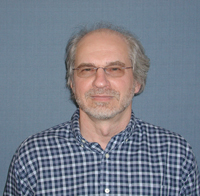Michael Leja
University of Pennsylvania
September–December 2008

Michael Leja, a professor in the department of art history at the University of Pennsylvania, studies the visual arts in various media (painting, sculpture, film, photography, prints, illustrations) in the nineteenth and twentieth centuries, primarily in the United States. He is especially interested in examining the interactions between works of art and particular audiences. He is the author of many books, chapters, and articles, including the prize-winning books Looking Askance: Skepticism and American Art from Eakins to Duchamp (Berkeley, 2004) and of Reframing Abstract Expressionism: Subjectivity and Painting in the 1940s (New Haven, 1993). His Clark project, for which he has also won a Guggenheim Fellowship, is an examination of the aesthetic and social effects of the industrial production of pictures in the U.S. between 1830 and 1875. This case study will provide a basis for critical evaluation of influential theories of mass visual culture associated with Benjamin, Adorno, Huyssen, Hall, and others.